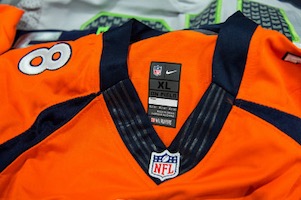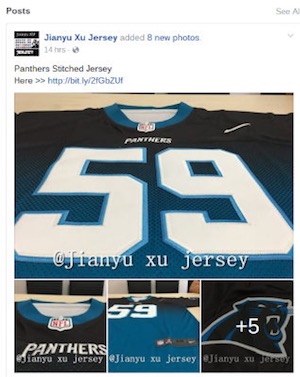
“Counterfeit NFL Jerseys Seized by CBP at JFK International Mail Facility” by Josh Denmark/U.S. Customs & Border Patrol. Public domain.
In the United States, the attire worn by spectators at sports events has changed significantly over the course of decades. As is noted in an article published this February by Sports Illustrated, the last 40 years has seen the American sports fan ditch traditional civilian garb to sport the colors of their favorite team and wear jerseys emblazoned with the names and numbers of their favorite athletes. According to SI, separate sporting goods licensing agencies for the National Football League (NFL), Major League Baseball (MLB) and the National Hockey League (NHL) were established in the 1960s; the National Basketball Association (NBA) started its licensing operations in 1982.
Fans of professional sports have turned sporting goods into a large industry in the United States. Online statistics portal Statista projected the 2015 consumer sporting good market in the U.S. to reach nearly $64 billion, almost $45 billion of which is attributable to purchases at sporting goods sales stores in the U.S. Although footwear earned more sales revenue ($21.17 billion), the $14.1 billion in revenues gained through the sale of sports clothing proves that jerseys have the power to get U.S. consumers to open their pocket books to purchase a single clothing item that’s typically priced between $100 and $300 for an officially licensed version. This April, a press release issued by the NFL Players Association (NFLPA) indicated that NFLPA licensees generated more than $1.5 billion during the 2015-16 season for retail sales of licensed NFL products from jerseys to decals to bobbleheads.
 Of course, there are plenty of avenues around paying such high fees in the Internet age. On Facebook, there is a page called Jianyu Xu Jersey, which sells various versions of sports jerseys, mainly NFL jerseys with jersey prices for active NFL players starting at $19.50 The have pictures showing Luke Kuechly’s Carolina Panthers jersey and Cameron Jordan’s New Orleans Saints jersey. There’s a video showing the quality of the stitching on a version of Rob Gronkowski’s New England Patriots jersey. Nowhere on the page is there any indication that the jerseys are officially licensed by the NFL, and the page says they are a wholesaler even though there is a ‘Shop Now’ button. And, if you click the ‘Shop Now’ button you are taken to a page where the logo misspells the word “Jersey” and clearly promotes the usage of Western Union when purchasing. When reached for comment and asked whether the jerseys they sell are officially licensed by the NFL Jianyu Xu Jersey simply responded: “Sure.” But misspellings, $20 for a $200 jersey, encouraging use of Western Union wire transfers, and no visible mention of being officially licensed NFL merchandise should raise at least some suspicions.
Of course, there are plenty of avenues around paying such high fees in the Internet age. On Facebook, there is a page called Jianyu Xu Jersey, which sells various versions of sports jerseys, mainly NFL jerseys with jersey prices for active NFL players starting at $19.50 The have pictures showing Luke Kuechly’s Carolina Panthers jersey and Cameron Jordan’s New Orleans Saints jersey. There’s a video showing the quality of the stitching on a version of Rob Gronkowski’s New England Patriots jersey. Nowhere on the page is there any indication that the jerseys are officially licensed by the NFL, and the page says they are a wholesaler even though there is a ‘Shop Now’ button. And, if you click the ‘Shop Now’ button you are taken to a page where the logo misspells the word “Jersey” and clearly promotes the usage of Western Union when purchasing. When reached for comment and asked whether the jerseys they sell are officially licensed by the NFL Jianyu Xu Jersey simply responded: “Sure.” But misspellings, $20 for a $200 jersey, encouraging use of Western Union wire transfers, and no visible mention of being officially licensed NFL merchandise should raise at least some suspicions.
Chinese production of counterfeit NFL jerseys and other sports apparel has also attracted the attention of domestic crime rings looking to make money from unsuspecting consumers, many of whom are purchasing a low-quality product compared to the officially licensed version. This August, four men were charged with racketeering after conducting sales of unlicensed Denver Broncos apparel, along with apparel for other professional and collegiate teams in the Denver area, over the course of nine years. The scheme involved wiring a total of $868,000 to China over the course of the operation for the production of the unlicensed apparel. Agents from the U.S. Department of Homeland Security (DHS) seized $68,000 worth of unlicensed goods from a flea market booth operated by the racketeers in January 2015.
At first glance, it’s often difficult to tell the difference between an authentic jersey and a counterfeit, especially if the proper color scheme and jersey material are reproduced. One detail that can be quickly surveyed to determine the authenticity of a jersey, however, is pointed out in an article published this February by Consumerist. According to that publication, the stitching detail featured on a jersey often gives away clues as to whether a particular jersey is a counterfeit, even if it appears to have all of the official NFL logos. Signs of counterfeiting can be seen in embroidered stitching when lettering is misspelled (i.e.: “Brondos” instead of “Broncos). Turning the jersey inside out will show whether there are loose threads on the inside or if embroidered lettering is formed using a single seam of stitching, both of which indicate a rushed sewing job.
Of course, there are plenty of consumers who don’t particularly care about the quality so long as the price is much lower than the comparatively exorbitant costs of an officially licensed jersey. Those consumers should be aware, however, that their cost-cutting maneuvers end up damaging our domestic economy in many ways that can remain unseen until it’s too late. A Forbes contributor piece published this November noted that counterfeits can infiltrate large domestic retailers and reputable e-commerce sites alike. Purchases of counterfeits can also trigger inflation by offering lower quality goods at a similar price point to official products. Counterfeit jerseys might be relatively cheap compared to those licensed by professional sports organizations, but those prices will likely rise if demand continues unchecked.
MLB organizations seem to be particularly proactive in the realm of fighting against counterfeit apparel. In the past few months, the Chicago Cubs have taken action in court to obtain an ex parte seizure order to seize counterfeit Cubs apparel being sold outside Wrigley Field. The Cubs have also proven themselves to be practiced defenders of the team’s own trademarks, filing nearly 50 trademark challenges at the Trademark Trial and Appeal Board (TTAB) through most of 2016.
America’s professional baseball league also seems to be better capable of reaching the low price points for its apparel, which can get consumers to pay for licensed goods. A quick Google Shopping search shows that, while it’s difficult to find officially licensed NFL jerseys selling for less than $100, it’s not hard to find gear for MLB teams which sells for $50 or less from stores like Fanatics or MLBShop.com, both of which market themselves as retailers of officially licensed sports apparel.

![[IPWatchdog Logo]](https://ipwatchdog.com/wp-content/themes/IPWatchdog%20-%202023/assets/images/temp/logo-small@2x.png)

![[Advertisement]](https://ipwatchdog.com/wp-content/uploads/2024/05/Quartz-IP-May-9-2024-sidebar-700x500-1.jpg)
![[Advertisement]](https://ipwatchdog.com/wp-content/uploads/2024/04/Patent-Litigation-Masters-2024-sidebar-last-chance-700x500-1.jpg)

![[Advertisement]](https://ipwatchdog.com/wp-content/uploads/2021/12/WEBINAR-336-x-280-px.png)
![[Advertisement]](https://ipwatchdog.com/wp-content/uploads/2021/12/2021-Patent-Practice-on-Demand-recorded-Feb-2021-336-x-280.jpg)
![[Advertisement]](https://ipwatchdog.com/wp-content/uploads/2021/12/Ad-4-The-Invent-Patent-System™.png)






Join the Discussion
6 comments so far.
Debby
January 18, 2017 02:20 pmI ordered a Seahawks jersey from Champs. Website showed them being in the US. However, it was shipped from China. My daughter has had this for not even 1 month and the official label came off – it was put on with some kind of tape. If it’s an official jersey, is the tag (on the bottom front of the jersey with size and NFL) supposed to be stitched on? Not happy.
Steve Brachmann
January 5, 2017 02:12 pm@Mike David Baker – Any chance that somebody ordered it for you? I can’t imagine that anyone’s in the business of giving jerseys away for free, even counterfeit ones.
Mike David Baker
January 5, 2017 04:06 amOkay I have an unusual comment I received a football jersey from Shanghai China of my favorite team but here’s the glitch I didn’t order it I got it for free I didn’t spend a dime and I got the Shanghai trying to answer you to my favorite football team but at the bottom left-hand corner it’s got fake labels and they didn’t get the NFL logo right so I’m wondering what the hex going on
bigwheel
December 29, 2016 05:10 pmMore than likely, official jerseys are produced in the same kind of sweat shops that knock-offs come from, and you shouldn’t expect pristine quality just because it was endorsed by the NFL and it has a $150 price tag. With that money, about all you can hope for is a guarantee that the team’s name is spelled properly, congratulations on looking like everyone else at the game. It’s not like Tom Brady stitched it himself, either, you’re being conned one way or another when you buy a jersey, official or not.
tifoso
December 24, 2016 09:20 amWhen pricing a product, one must consider factors, such as, the price at which potential consumers will seek a substitute. To cavalierly ignore this is engage in gouging. For most consumers, price is a key determinant. That is why stores like Walmart drive out local, higher priced, merchants. Why pay $3. for toothpaste at the local drugstore when Walmart sells the identical product for $1.?
As do his claims about quality. For most who wear team clothing, quality is a non-issue. Players move to other teams. Even the knock offs will outlast most player’s tenure.
Most consumers are wise enough to know that a player-named jersey costs the maker no more than a $25. and was probably made in China, anyway. Charging $200. for that jersey invites counterfeits where a more reasonable price will not.
Steve’s attempt to link refusal to be gouged to the health of the overall economy is beyond reaching for justification. The sky is not going to fall. No one has a duty to support gougers.
Inventor Woes
December 23, 2016 10:24 pmIn this particular case I can’t say I blame consumers for going for cheap alternatives. I say this because 100 dollars for a jersey seems like overkill. Furthermore, it’s not some life-saving or society-changing invention. It’s just a jersey…